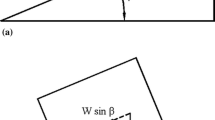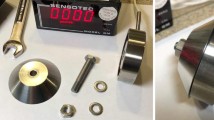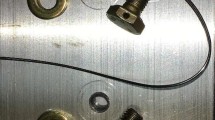Abstract
This paper presents analyses of prevailing torque locking features common in locknuts, inserts and bolts. Existing manufacturing specifications for these components quantify required minimum and maximum locking torque values for a wide range of thread sizes. The self-loosening moment inherent to threaded fasteners and dependent on joint preload and thread pitch is computed and compared to the specification locking torque values. The self-loosening moment alone, i.e., not including loosening from external loads, is found to exceed the minimum locking torque manufacturing specification values for all fastener sizes at typical preload and for some large thread sizes is found to exceed the maximum locking torque specification. Calculations are provided for SAE and AN fasteners. Sample prevailing torque measurements from locknuts are presented which are well above the minimum specification. Analysis for the loosening moment from an external axial load is developed and presented with example calculations. Fastener locking requirements are defined.








Similar content being viewed by others
References
D. Hess, Threaded fastener secondary locking requirements. J. Fail. Anal. Prev. 17, 724–730 (2017)
D. Hess, Threaded fastener locking with safety wire and cotter pins. J. Fail. Anal. Prev. 18, 1216–1223 (2018)
NASM25027, Nut, self-locking, 250°F, 450°F and 800°F, National Aerospace Standard (1999)
NASM8846, Inserts, screw-thread, helical coil, National Aerospace Standard (1998)
MIL-I-45914A, Insert, screw thread—locked in, key locked. Department of Defense Military Specification (1991)
MIL-I-45932, Insert, screw thread—thin wall, locked in. Department of Defense Military Specification (1971)
NAS3350, Nuts, self-locking, 450°F and 800°F, high quality. National Aerospace Standard (2006)
MIL-DTL-18240F, Fastener element, self-locking, threaded fastener—250°F maximum. Department of Defense Detail Specification (1997)
J. Bickford, An Introduction to the Design and Behavior of Bolted Joints (CRC Press, Boca Raton, 1995), pp. 140–142
VDI 2230, Systematic Calculation of High Duty Bolted Joints–Joints with One Cylindrical Bolt, Verein Deutscher Ingenieure (2003)
E. Oberg, F. Jones, H. Horton, H. Ryffel, Machinery’s Handbook, 25th edn. (Industrial Press, New York, 1996)
SAE J429, Mechanical and material requirements for externally threaded fasteners (2014)
AN3 THRU AN20, Bolt—machine, aircraft. Department of Defense Military Specification Sheet (1991)
NASM20073, Bolt, machine, aircraft, drilled head, fine thread. Department of Defense Military Standard (2000)
MS20073, Bolt, machine, aircraft, drilled head, fine thread. Department of Defense Military Standard (1984)
NASM20074, Bolt, machine, aircraft, drilled head, coarse thread. Department of Defense Military Standard (2000)
MS20074, Bolt, machine, aircraft, drilled head, coarse thread. Department of Defense Military Standard (1985)
MIL-B-6812 E, Bolts, Aircraft. Department of Defense Military Specification (1994)
G. Meyer, Simple diagrams air in analyzing forces in bolted joints. Assem. Eng. 15, 28–33 (1972)
J. Goodier, R. Sweeney, Loosening by vibration of threaded fastenings. Mech. Eng. 67, 798–802 (1945)
Acknowledgment
The author gratefully acknowledges the support of Dr. Michael Dube and the NASA NESC.
Author information
Authors and Affiliations
Corresponding author
Rights and permissions
About this article
Cite this article
Hess, D.P. Prevailing Torque Locking in Threaded Fasteners. J Fail. Anal. and Preven. 18, 1562–1572 (2018). https://doi.org/10.1007/s11668-018-0555-9
Received:
Published:
Issue Date:
DOI: https://doi.org/10.1007/s11668-018-0555-9




